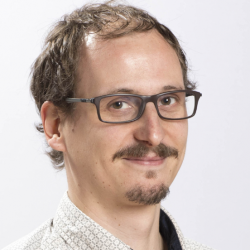Donders Institute, Nijmegen
Florian Krause
Postdoc

I'm a researcher in Cognitive Neuroscience. My main research interests include (real-time) fMRI, neurofeedback, large-scale brain networks, stress, resilience, embodied cognition and numerical cognition.
I am also the main developer of Expyriment, a Python library for designing and conducting timing-critical bahavioural and neuroimaging experiments.
I did my PhD at the Donders Institute for Brain, Cognition and Behaviour at Radboud University in Nijmegen, The Netherlands, as part of the Action and Neurocognition group of Harold Bekkering as well as the Intention and Action group of Ivan Toni, and in collaboration with Oliver Lindemann from the Potsdam Embodied Cognition Group. During this time I got concerned with the question of how former sensorimotor experiences shape our cognition and how differences in these experiences can lead to individual traits in cognitive functions. For instance, my research in the fields of embodied cognition and numerical cognition focuses on the neurocognitive representation of numerical magnitude and the question of whether numerical concepts are "grounded" in former sensorimotor experiences with size in everyday life. I address these issues by investigating human adults and children, using an integrated empirical approach which combines a variety of behavioural measures (e.g. reaction time, kinematics) as well as neuroimaging techniques (e.g. functional Magnetic Ressonance Imaging, Voxel-Based Morphometry).
After my PhD, I worked on the European BRAINTRAIN project as a postdoctoral researcher for Rainer Goebel at Brain Innovation B.V. and Maastricht University in Maastricht, The Netherlands, where I was investigating how the self-regulation of brain networks by (combined) Electroencephalography (EEG) and functional Magnetic Resonance Imaging (fMRI) neurofeedback can be methodologically further advanced and utilised as a therapeutic measure for mental disorders. For instance, we recently investigated the effect of varying the visual presentation of a neural feedback signal on individuals' self-regulation success. In another project we implemented a simple real-time functional connectivity measure (partial correlation) and explored the feasibility of using this as a neurofeedback signal during a visual motion task.
Here at the Cognitive Affective Neuroscience lab of Erno Hermans, I am now applying the knowledge gained from the BRAINTRAIN project to the European STRESNET project, by investigating more advanced network-based real-time fMRI measures for developing Neurofeedback training to increase stress resilience.
Contact
-
Kapittelweg 29
Room 00.015
6525 EN Nijmegen
The Netherlands -
Donders Institute for Brain, Cognition and Behaviour
Radboud University Medical Center
P.O. Box 9101
6500 HB Nijmegen
The Netherlands
- (+31) 024 36 10618
- f.krause@donders.ru.nl
-
floriankrause.org
-
ORCID